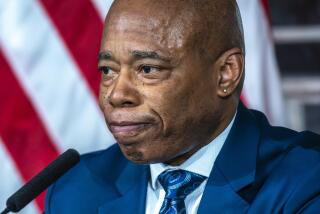Seeing Police Through a Glass Darkly
- Share via
The perpetrator--or “perp,” as the cops would later refer to him--was prostrate on the pavement, encircled by five cops. All of them were kicking him and swearing. I saw this late on a Saturday night from my fifth floor New York City apartment window, and not surprisingly, I was shocked.
Now, I’m usually not one to cast aspersions at Johnny Law. By shooing the ubiquitous drug pushers off the curbs of the East Village, Mayor Rudolph Giuliani’s much-maligned police force gave me back my neighborhood.
When I moved in seven years ago, I was too afraid to leave my building after dark. Today my block is a haven for trendy lounges and pricey bistros instead of a dumping ground for miscreants and addicts. I feel safe walking the streets at 3 a.m., and I’m inestimably grateful to New York’s finest for that.
Nonetheless, when I witnessed the police wielding what could only be described as excessive force, I wasn’t going to give them a free pass. I ran downstairs to see if I could get the officers’ names, but by then the cops had already wedged the perp into a cruiser and driven off. Still, there were witnesses, three black guys who had been driving by. They had stopped, they told me, because they’d seen some guy on the ground taking a beating and had planned, if possible, to intervene.
“Was the guy black?” I asked. It had been too dark for me to tell. “Hispanic,” they said.
“Did you see what I saw?” I urged. They nodded. I thanked them, took their numbers and headed for the precinct to lodge a complaint.
I learned from the desk sergeant there that the perp actually was white. He allegedly had tried to steal a car and had gotten into a fistfight with the arresting officer, who had then called for backup. I told the sergeant what I’d seen: “They were kicking the guy while he was on the ground.”
“He had been fighting with a cop,” he said. “Have you ever been in a fight?”
“No,” I snapped. “Not when it’s five against one.”
“That’s your perspective,” he replied defensively.
“Where is the guy now?”
“In the emergency room being treated for Mace.”
“They Maced him?” I asked. “And they still kicked him when he was down?”
He grumbled and said, “To know the whole story, you’ve got to wear the shoes.”
I filled out my complaint in silence and left. As I walked home, my thoughts about the incident began to coalesce. First there was the race thing. In typical paranoid style, the black guys on the street had assumed the perp was Latino. “The cops always harass people of color,” they had said.
Not this time. The fact that this perp was white proved two things: Cops rough up whites as well as blacks, and people see what they want to see.
Was I guilty of the same thing? What had I seen?
With race out of the picture and on reflection, I was able to see the cops’ reaction for what it was--accumulated, amorphous rage spilling out in the adrenalized moment. It wasn’t fueled by racial animus. It was generic, the inevitable result of working the mean streets, facing the death, danger and atrocities that cops face constantly so that we don’t have to.
This didn’t excuse it, but it helped to explain its cause. It also helped me to understand why police malfeasance probably can’t be eradicated.
Taking the psychic damage out of urban policing isn’t possible. You can’t be a street cop and altogether avoid the endemic stress of your job, any more than you can live sanguinely in the ghetto. We take environment and conditioning into account when we talk about the poor and even the perps we’re so eager to see as victims, but we grant no dispensations to the cops. We send them into a war zone and expect them to behave impeccably. They should stay above it, we presume. But that’s unrealistic and unfair.
So, if prevention is a no-go, what’s the answer?
How about help? We need to give cops more safe outlets for rage, better ways to manage inordinate stress off the beat. Sensitivity training isn’t the way. Their human sensitivity to their surroundings is exactly the problem.
The cops assaulted somebody on that Saturday night, and for that they should be disciplined. But they also should be treated, because, in many cases, their violence is a symptom, not a disease.
More to Read
Sign up for Essential California
The most important California stories and recommendations in your inbox every morning.
You may occasionally receive promotional content from the Los Angeles Times.













